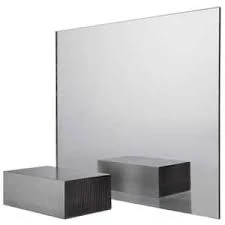

The Versatility and Applications of Coated Float Glass
Coated float glass is a revolutionary product that has transformed the glass industry, offering enhanced functionality, aesthetic appeal, and energy efficiency. This specialized form of glass is produced by a process known as float glass production, where molten glass is floated on molten tin to create a flat and uniform sheet. The key distinguishing feature of coated float glass is its surface treatment, which adds specific properties aimed at improving its performance in various applications.
One of the primary benefits of coated float glass is its ability to control solar energy transmission. Through the application of thin films or coatings, manufacturers can produce glass that reflects solar radiation, reduces glare, and minimizes heat gain. This is particularly important in buildings where energy efficiency is a primary concern. By decreasing the reliance on air conditioning systems, coated float glass can significantly lower energy costs while enhancing indoor comfort. The ability to select different levels of light and solar heat transmittance allows architects and designers to make informed choices based on the specific needs of a building's location and orientation.
Moreover, coated float glass is also valued for its aesthetic versatility. The coatings can be applied in a myriad of colors and finishes, allowing for a wide range of design possibilities. Whether it’s a sleek modern office building, a vibrant retail space, or a residential home, coated float glass can complement any architectural style. This aesthetic quality, combined with functional benefits, allows designers to integrate glass elements into their projects seamlessly, creating spaces that are not only beautiful but also practical.
In addition to its use in buildings, coated float glass has significant applications in the automotive industry. Car manufacturers utilize this type of glass for windshields and windows to enhance passenger comfort and safety. The coatings applied to automotive glass can provide UV protection, reducing the impact of harmful rays on occupants while also protecting the vehicle’s interior from fading. Furthermore, certain coatings can improve the durability of the glass, making it more resistant to scratches and shattering, thereby increasing overall safety.

Another important application of coated float glass is in the realm of solar energy. As the world shifts towards sustainable energy sources, glass panels integrated with coatings are increasingly used in solar thermal and photovoltaic systems. These coatings are designed to optimize light absorption and enhance the efficiency of solar panels, thereby contributing to the transition towards renewable energy solutions.
Coated float glass is also increasingly utilized in various industrial applications, including display cases, furniture, and interior partitions. The unique properties of the coatings can enhance durability, cleanability, and resistance to corrosion. This makes coated float glass suitable for use in environments that are subject to harsh conditions, such as laboratories or commercial kitchens.
Despite its many advantages, it is essential to consider the environmental impact of glass production and coatings. Sustainable practices and recycling initiatives are becoming increasingly vital in the glass industry. Manufacturers are exploring eco-friendly coating materials and processes to minimize the carbon footprint associated with production. By adopting these practices, the industry can contribute to a greener future while continuing to innovate.
In conclusion, coated float glass represents a significant advancement in glass technology, offering a combination of aesthetic appeal, energy efficiency, and functional versatility. Its applications are vast, spanning architecture, automotive, solar energy, and industrial uses. As the demand for sustainable and efficient building materials continues to grow, the role of coated float glass will undoubtedly expand, paving the way for innovative designs and practices that benefit both consumers and the environment.